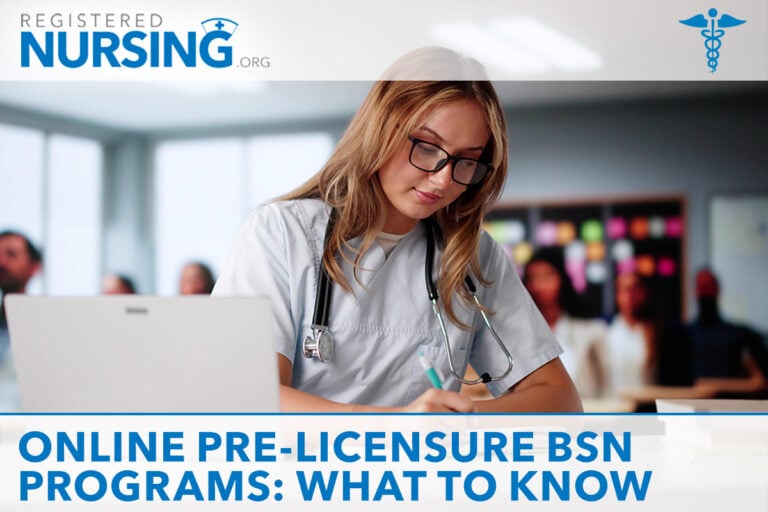Online BSN Pre-Licensure Schools: What to Know
- What Is an Online Pre-Licensure BSN Degree?
- Who Are These Programs For?
- Admissions Requirements
- Curriculum and Coursework
- How Are Clinical and Simulation Experiences Handled?
- The Online BSN Learning Experience
- Preparing for Licensure: The NCLEX-RN
- Online BSN vs. Traditional Campus-Based BSN
- Comparing Online BSN Pathways
- Cost and Financial Aid
- Career Outlook for BSN-Prepared Nurses
- Popular Online BSN Program Options
- Latest Articles & Guides

Earning a Bachelor of Science in Nursing (BSN) has long been the gold standard for those entering the field of professional nursing. Until recently, however, students without prior nursing licensure could only pursue this path in traditional, on-campus programs. Today, online pre-licensure BSN programs are expanding access, allowing future nurses to complete much of their coursework online while gaining hands-on experience through approved clinical partnerships.
Unlike RN to BSN programs, which are designed for already-licensed nurses looking to advance their nursing education, online pre-licensure BSN programs are for new nursing students seeking their first RN credential. These innovative programs combine flexibility, academic rigor, and real-world training to prepare students for the NCLEX-RN exam and entry-level nursing practice.
What Is an Online Pre-Licensure BSN Degree?
An online pre-licensure BSN program provides the same foundational nursing education as a traditional on-campus BSN but delivers much of the coursework online. Students complete lectures, assignments, and exams through a digital learning platform, while fulfilling clinical and laboratory requirements through local healthcare partnerships or designated regional sites.
These programs are accredited by organizations such as the Commission on Collegiate Nursing Education (CCNE) or the Accreditation Commission for Education in Nursing (ACEN). Accreditation ensures quality and is essential for graduates to become eligible for licensure and graduate-level nursing programs.
Because nursing is a regulated profession, state board approval is also critical. Many online BSN programs are authorized to enroll students only from specific states where they have established clinical partnerships. Before applying, prospective students should confirm that their state is eligible for enrollment and clinical placement.
Who Are These Programs For?
Online pre-licensure BSN programs are ideal for individuals who:
- Want to become registered nurses but need the flexibility of online learning
- Live in rural areas without nearby nursing schools
- Are career changers seeking a first nursing degree
- Have completed some college coursework or general education credits
- Need to balance family, work, or other obligations while studying
- Are recent high school graduates looking for a convenient pathway to a nursing degree
These programs offer a flexible entry point into nursing while maintaining the high standards required for licensure.
Admissions Requirements
Admission to an online BSN program is competitive and varies by school, but applicants generally need to meet the following criteria:
- Completion of general education prerequisites such as anatomy and physiology, microbiology, human growth and development, chemistry, statistics, and English composition
- A minimum GPA (often 2.75–3.0 or higher) in prerequisite courses
- TEAS, HESI, or ACT/SAT scores (depending on the institution)
- Proof of immunizations, CPR certification, background checks, and drug screening prior to clinical placements
- Residency in an approved state (many online pre-licensure BSNs cannot accept students nationwide due to clinical agreements and state nursing board regulations)
Applicants are encouraged to verify state eligibility early in the process to avoid delays or ineligibility after acceptance.
Curriculum and Coursework
The online pre-licensure BSN curriculum provides a thorough foundation in nursing theory, health sciences, and patient care. While didactic courses are completed online, students still engage in hands-on lab work and clinical rotations to develop essential bedside skills.
Common Courses Include:
- Foundations of Professional Nursing
- Health Assessment
- Pathophysiology and Pharmacology
- Nursing Care of Adults, Children, and Families
- Community and Public Health Nursing
- Leadership and Evidence-Based Practice
- Nursing Research and Ethics
Programs typically consist of 120–130 credit hours, including both general education and nursing courses. Full-time students usually complete the degree in three to four years, though pacing options may vary.
How Are Clinical and Simulation Experiences Handled?
Clinical and simulation training are essential components of every nursing degree, including online BSN programs. While classroom theory is delivered online, students gain the hands-on experience needed for licensure through supervised clinical rotations and simulation labs.
Clinical Placements
Most programs partner with approved healthcare facilities in select states to host clinical rotations. Students are usually placed at hospitals or clinics within commuting distance of their home, though state authorization rules limit where each program can operate.
- Clinicals are arranged or verified by the school to meet accreditation standards.
- Some programs offer evening or weekend rotations for working students.
- Short, in-person intensives or skill check-offs may be required on campus or at regional sites.
Before applying, students should confirm that their state is eligible for enrollment and that local clinical sites are available.
Learn more about BSN clinical rotations.
Simulation Training
To complement real-world experience, online BSN programs use modern simulation technology that mirrors hospital settings.
- Virtual patient simulations allow students to make care decisions online and receive feedback.
- High-fidelity manikins are used during required in-person labs or residencies.
- Many states now permit a portion of clinical hours to be completed through approved simulation activities.
These tools help students practice safely and develop critical-thinking, communication, and leadership skills before caring for actual patients.
Skill Development and Evaluation
Qualified instructors or preceptors supervise all clinical and simulation experiences. Students are evaluated through direct observation, skills check-offs, and written reflections to ensure they meet professional competency standards. Successful completion of both components is required to graduate and qualify for the NCLEX-RN exam.
Online pre-licensure BSN programs balance flexibility with rigorous hands-on learning. Through local clinical placements and realistic simulations, students build the confidence and experience necessary to enter nursing practice safely and effectively.
The Online BSN Learning Experience
Online pre-licensure BSN programs use secure learning management systems (LMS) to deliver coursework and support communication between students and instructors. Depending on the school, classes may be synchronous, asynchronous, or a blend of both.
- Synchronous learning means students log in at specific times to attend live lectures, group discussions, or lab demonstrations via video conference. This format offers real-time interaction with faculty and classmates, similar to a traditional classroom.
- Asynchronous learning allows students to complete lessons, watch recorded lectures, and submit assignments on their own schedule. This flexibility makes it easier for students balancing jobs or family obligations to progress at their own pace.
Most online BSN programs combine the two, offering asynchronous coursework for theory-based classes and synchronous sessions for labs, group projects, and skill demonstrations.
In addition to virtual instruction, students can expect:
- Online exams and proctored assessments
- Interactive case studies and simulations
- Virtual advising, tutoring, and success coaching
- Discussion boards that promote collaboration and critical thinking
While the delivery is online, the rigor matches that of campus-based nursing programs. Students must stay organized and engaged to manage a demanding schedule that blends academic study with clinical training.
Preparing for Licensure: The NCLEX-RN
Graduates of online pre-licensure BSN programs are eligible to take the National Council Licensure Examination for Registered Nurses (NCLEX-RN), the final step toward becoming a licensed RN.
Programs often include:
- Integrated NCLEX preparation modules throughout coursework
- Practice exams and review sessions
- Guidance on licensure application procedures and state board requirements
NCLEX pass rates are an important indicator of program quality, and reputable online pre-licensure BSNs publish this data publicly.
Online BSN vs. Traditional Campus-Based BSN
While both online and traditional BSN programs lead to the same nursing degree and RN licensure eligibility, their learning experiences differ significantly in delivery and flexibility.
Similarities
- Both must meet the same accreditation and state board standards.
- Graduates of either program qualify for the NCLEX-RN exam.
- Coursework covers the same core subjects in nursing science, patient care, and leadership.
- Both require in-person clinical rotations to develop practical nursing skills.
Key Differences
| Aspect | Online Pre-Licensure BSN | Traditional Campus-Based BSN |
| Learning Format | Online lectures with occasional in-person labs | Fully in-person classes and labs |
| Clinical Placement | Arranged locally or regionally in approved states | Arranged through the school's direct hospital affiliations |
| Flexibility | Ideal for students balancing work or family obligations | Fixed class schedules and campus attendance required |
| Geographic Reach | Limited to states where clinical partnerships exist | Typically limited to local or in-state students |
| Technology Use | Heavy use of virtual labs, simulations, and LMS tools | More emphasis on in-person skill labs and faculty demonstrations |
Why Choose One Over the Other?
Students might choose an online pre-licensure BSN if they:
- Need the flexibility to study from home
- Live far from a nursing school but within an eligible clinical state
- Prefer asynchronous or self-paced learning
In contrast, students may prefer a traditional BSN if they:
- Thrive in face-to-face classroom environments
- Want daily on-campus interaction with peers and instructors
- Live near an accredited nursing school with strong local hospital ties
Ultimately, both paths lead to the same professional outcome – a BSN degree and RN licensure – but online pre-licensure BSN programs make that goal more attainable for students who require flexibility or live in underserved regions.
Comparing Online BSN Pathways
| Feature | Online Pre-Licensure BSN | Online RN to BSN | Online Accelerated BSN (ABSN) |
| Target Student | Aspiring nurses with no prior RN license | Licensed RNs with an ADN or diploma | Non-nurses with a prior bachelor's degree |
| Program Length | ~3–4 years | ~1–2 years | ~12–18 months |
| Clinical Component | Required; arranged locally | Often not required | Required; intensive and fast-paced |
| Delivery Mode | Mostly online with local clinicals | Fully online | Hybrid/online with clinicals |
| Outcome | BSN + NCLEX eligibility | BSN completion only | BSN + NCLEX eligibility |
| Admissions Requirements | Prerequisites + TEAS/HESI | Active RN license + ADN | Prior bachelor's degree + prerequisites |
| Ideal For | First-time nursing students needing flexibility | Working RNs advancing education | Career changers seeking fast entry |
Learn more about Accelerated BSN (ABSN) programs.
Cost and Financial Aid
Tuition for online pre-licensure BSN programs typically ranges from $40,000 to $80,000 in total, depending on location, pacing, and residency status. Additional costs may include:
- Technology and lab fees
- Clinical attire and equipment
- Travel expenses for in-person labs or clinical rotations
Students may qualify for federal financial aid, institutional scholarships, or state nursing grants. Some hospitals and healthcare systems also offer tuition reimbursement for employees pursuing nursing degrees.
Career Outlook for BSN-Prepared Nurses
Graduates who pass the NCLEX-RN can begin working as registered nurses in:
- Hospitals and health systems
- Community and public health agencies
- Long-term care or rehabilitation facilities
- Schools, clinics, and home health services
According to the U.S. Bureau of Labor Statistics, registered nursing employment is projected to grow steadily through 2034, driven by an aging population and healthcare expansion. Many employers now prefer or require BSN-educated nurses, and online BSN programs help meet this workforce need by expanding access to qualified candidates.
Popular Online BSN Program Options
- Chamberlain University – Online BSN: Offers online didactic coursework with hands-on clinical experiences at approved locations. Designed for students seeking flexibility while earning their first nursing degree.
- Herzing University – Online BSN Program: Combines online classes with clinical placements coordinated in select states. Provides strong academic support and NCLEX preparation resources.
- Western Governors University (WGU) – RN Pre-Licensure BSN: Features a competency-based hybrid model where students progress at their own pace. Clinical experiences are offered through regional partnerships.
One of the keys to success as a registered nurse is embracing lifelong learning. Our articles and guides address hot topics and current events in nursing, from education to career mobility and beyond. No matter where you are on your nursing journey, there’s an article to help you build your knowledge base. Browse our latest articles, curated specifically for modern nurses.Latest Articles & Guides



